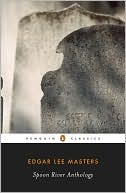 Author: Edgar Lee Masters
Author: Edgar Lee Masters
Publisher: Signet Classics
Year Published: 1915
Rating: 
Buy from Amazon.com
I’d never have known of the existence of this little treasure if not for Ross Mitchell, Executive Director of Laurel Hill Cemetery in Philadelphia. During an interview with Ross, he mentioned that portions of the book will be re-enacted on the cemetery grounds during the Philadelphia Fringe Festival on September 9, 2006.
About Edgar Lee Masters
The author of this poetic odyssey, Edgar Lee Masters (1869-1950), was an enormously prolific American writer and poet. He is known mainly for Spoon River, his most popular work. Ezra Pound said “at last, America has discovered a poet” in reference to Masters. He author was dubbed “the natural child of Walt Whitman” by one critic, as his poetic style is similar to Whitman’s. (Whitman, by the way, is buried across the river from Philadelphia, at Harleigh Cemetery in Camden, NJ).
Structure of Spoon River
The book is essentially a collection of poems written by Masters, epigrams which detail the lives of the many residents of a fictitious midwestern town in the late 1800s. Though more about the human condition, the book is written with the town as a backdrop to 245 single-page monologues by the deceased – as if they wrote their own epitaphs. The poetry is free verse, sometimes beautiful, always poignant in its relation to the balance of life and death. Spoon River is deceptively light reading, but is not to be taken lightly.
After Death, Life Lamented
The epitaphs chronicle the aspirations and interactions, the defeats, the loves, lives, and deaths of these individuals. Most lament the fact that they were not appreciated, though a few are satisfied with their lives. Its timeless take-home message is that even in small-town America, nothing is ever as it seems.
Spoon River is an easy read, as most people’s lives are summed up in a page of poetry. It’s engaging because there are so many different personalities from so many walks of life. Whether it be the successful shopkeeper, the adulterer, unwed mother, or the poor but honest lawyer (Masters himself was a lawyer, serving with the famous Clarence Darrow’s law firm in the early 1900s), the reader is almost certain to relate to one.
Memorials to a Townspeople, Light on the Genealogy
Now townspeople of a different town, the inhabitants admit things about their lives that are a bit shocking, even to the contemporary reader. The book was highly controversial when it was first published (1915), causing quite a stir among political, literary, and religious conservatives. The experiences are loosely based on the small town in which Masters was born, one in which a bank collapse caused great turmoil. The book more than illustrates the trials and tribulations of people in rural America – it mirrors society in general and comments on all of our hypocritical behaviors. Families are loosely followed for two generations, but the book reads as though this entire fictional community passed on at the same time.
Life After Death (The Afterlife as a State of Melancholy)
The book provides interesting social commentary, sometimes amusing, usually melancholy. It reminds us of how one’s own epitaph can be so at odds with the printed obituary or verse carved onto a headstone, a diptych if there ever was! To paraphrase Masters, our true epitaphs are more lasting than stone. A great read for anyone interested in death and the afterlife.
Fringe Festival Performance – The Late Laureates of Laurel Hill (Cemetery)
Spoon River has been adapted to the stage in the past, even with musical scores added. As part of the 2006 Philly Fringe Live Arts Festival, a twilight reading of Spoon River will take place in Philadelphia’s Laurel Hill Cemetery. See the Fringe Festival website for details.